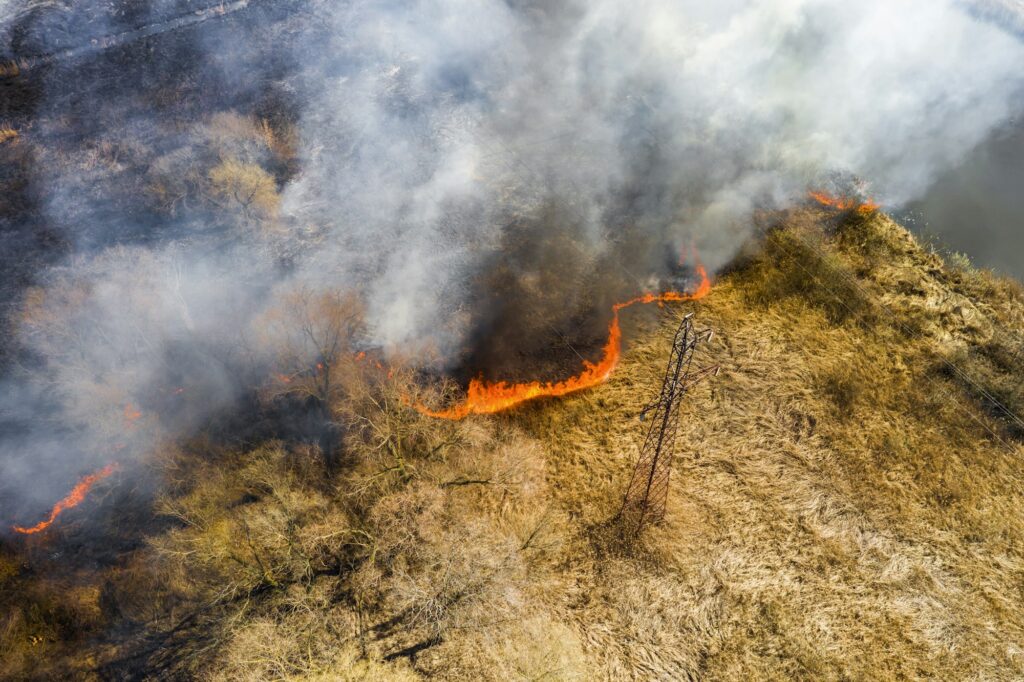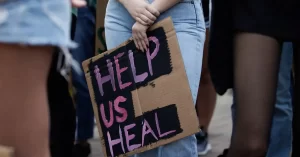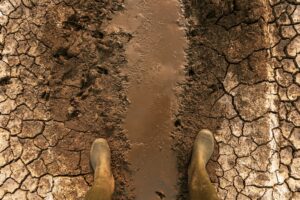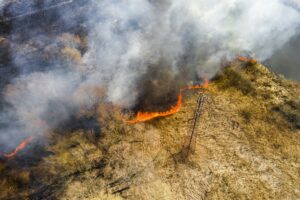Author:: Bagombeka Job
Climate change is reshaping the landscape of the United States, with one of its most dramatic and destructive manifestations being the increasing frequency and severity of wildfires. As global temperatures rise, weather patterns shift, and droughts become more prolonged, the conditions for wildfires have become more favorable. This trend has particularly severe implications for the American West, where millions of people now live under the constant threat of devastating fires. These rampant wildfires, fueled by climate change, not only destroy property and natural resources but also have profound impacts on human health, the economy, and community well-being.
The link between climate change and wildfires is well-established. Higher temperatures lead to drier vegetation, creating more fuel for fires. Additionally, changes in precipitation patterns result in longer dry seasons and shorter, more intense bursts of rainfall, which can trigger growth spurts in vegetation that later become fuel during dry periods. These climate-driven changes create a perfect storm for wildfires, making them more frequent and harder to control.
One of the most direct and devastating impacts of wildfires is the destruction of homes and infrastructure. In recent years, states like California, Oregon, and Washington have experienced some of the largest and most destructive wildfires in their history. The Camp Fire of 2018 in California, for instance, razed the town of Paradise, destroying nearly 19,000 buildings and claiming 85 lives. Such incidents highlight the immediate threat that wildfires pose to communities, forcing thousands of residents to evacuate and leaving many homeless. The rebuilding process is often long and arduous, and the psychological toll on displaced families can be immense.
Beyond the immediate destruction, wildfires have significant economic impacts. The costs of fighting fires are staggering and have been increasing over the years. According to the National Interagency Fire Center, the U.S. spent over $2 billion on wildfire suppression in 2020 alone. These expenditures do not account for the broader economic losses, including property damage, lost business revenues, and the long-term economic decline of affected areas. Tourism, a vital industry in many wildfire-prone regions, suffers immensely as natural attractions are damaged and visitors stay away due to safety concerns.
The health impacts of wildfires are another critical concern. Wildfire smoke is a complex mixture of gases and fine particles that can penetrate deep into the lungs and bloodstream, exacerbating respiratory and cardiovascular conditions. Populations already vulnerable due to age, pre-existing health conditions, or socioeconomic factors are particularly at risk. During major wildfire events, air quality can deteriorate to hazardous levels, leading to spikes in hospital admissions for asthma, heart attacks, and other health issues. The long-term exposure to particulate matter from repeated wildfire seasons is an emerging public health crisis, with potential implications for chronic disease prevalence and overall mortality rates.
Communities affected by wildfires also face significant mental health challenges. The trauma of losing homes, livelihoods, and even loved ones can lead to severe psychological distress. Studies have shown that individuals who experience natural disasters are at higher risk for conditions such as post-traumatic stress disorder (PTSD), depression, and anxiety. The disruption of social networks and community cohesion further exacerbates these mental health issues, making recovery even more difficult.
In addition to the direct impacts on human populations, wildfires have profound environmental consequences that indirectly affect people. The loss of forests and other natural habitats not only disrupts ecosystems but also reduces the capacity of these areas to act as carbon sinks, thus exacerbating climate change. Furthermore, the destruction of vegetation increases the risk of soil erosion and water contamination, which can lead to long-term declines in land productivity and water quality. These environmental changes can have cascading effects on local agriculture, water supplies, and overall ecosystem health, further stressing human communities.
Efforts to mitigate the impact of wildfires and adapt to the changing climate are critical. Fire management strategies are evolving to include not only immediate firefighting efforts but also preventive measures such as controlled burns, forest thinning, and the creation of firebreaks. These strategies aim to reduce the amount of fuel available for wildfires and create more resilient landscapes. Additionally, there is a growing recognition of the need for climate action to address the root causes of the increased wildfire risk. Reducing greenhouse gas emissions, investing in renewable energy, and promoting sustainable land-use practices are essential steps toward mitigating climate change and its impacts.
Public awareness and preparedness are also crucial components of wildfire resilience. Communities in fire-prone areas must be equipped with the knowledge and resources to protect themselves. This includes having evacuation plans, emergency kits, and understanding the importance of maintaining defensible space around properties. Education and community engagement can empower residents to take proactive steps to reduce their vulnerability to wildfires.
In conclusion, climate change has significantly amplified the threat of wildfires in the USA, with profound and far-reaching impacts on people’s lives. From the immediate destruction of homes and infrastructure to the long-term economic, health, and environmental consequences, the toll of rampant wildfires is immense. Addressing this challenge requires a multifaceted approach that includes improved fire management practices, climate action, and community preparedness. By taking these steps, we can build more resilient communities and safeguard the well-being of future generations in the face of an increasingly volatile climate.
Author:: Bagombeka Job











































